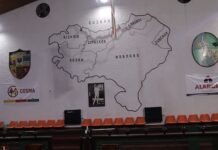This is our opinion and analysis. The scientific work is below the horizontal line…
We, the authors of the blog, have always had the intuition that the Basques have played an important role beyond their borders, always within the bounds of our extension and the small weigh of our population when compared to that of Europe.
It cannot be said that we started the blog with the specific goal of digging deeper into this topic, but it is true that, as the years have gone by, the proof of this reality has continually appeared in our research. We’ve understood that that perception of what the Basques have been and have done was but a small part of what really occurred.
Of course, as we’ve said, that transformative force of our forebears went unnoticed because it never shows itself, nor is it usually shown, with its own label, with a Basque label. From the 15th to the 20th centuries, during the age of discovery and the creation of a new worldwide reality, the role of this small group of Basques was simply dazzling, but diluted amongst larger labels, the Spanish and the French.
For those who think this is normal, it would be a good idea to see other examples, such as the leading role given to Extremadura and its people during the first colonization of the Americas, just like how the important role the Crown of Aragon had in the Mediterranean for centuries is almost completely forgotten.
We must also add in the role the Basques had in the New World colonies, or in the Far East, where Basques had preeminent positions in fields such as administration or trade. These aspects, however, are hardly glamorous, and disappear into the aspects history normally focuses on: the conquest of land and kingdoms.
That’s why scientific projects, like the one we’re bringing you today, and the others we’ve collected over the years (we’re currently in the process of properly labeling them with their own tag, and already we can bring you an interesting list) are so important. They’re works that are merely a rather unattractive bit of “local” history for “imperialist” historians, but they speak of the large and small stories, which is to say, everything that made the Americas what they are today.
These stories share the hard work put in to building societies, rather than conquering empires. They are, to put it another way, the stories of nobles, Basque nobles, who, unlike most of the other parts of the Kingdoms of the Spains, were used to putting in elbow grease, to trade and to build.
Among those following this line of analysis of History is the Consolidated Research Group in the University of the Basque Country System, and their Basque Country, Europe, and the Americas: Atlantic Links and Relations, which always surprises us with their research, and to which the two researchers who authored the project below belong. They offer us fragments of the History that is closest to us, and which we find much more interesting.
This research project was published in BOLETÍN AMERICANISTA.
(The original is in Spanish. Below you’ll find an extract translated by us)
Not just fish and flour in exchange for gold. Basques’ trade with the United States during the 18th century
This work began as a collaborative essay with the goal of putting in order a set of information that had led us to dig deeper into the little-researched topic of trade and diplomatic relations developed between the Basque Country and the United States of America.
Following the trail of archive information, we started down a historical path of brief images that had to be analyzed more carefully and which had focused deeply on the 17th century. From them, and to the first decades of the 19th century, the goal of the study focused on the routes and exchanged products, among which tobacco and codfish predominated. At the end of the period studied, we also tried to include other elements related to the basics of the diplomatic and trade relationships, especially focusing on the analysis of their protagonists: the strategies used, the personal links, and the letters.
This is yet one more line of those that make up the professional migratory processes of many Basques over the centuries of the Modern Age, and their integration into most relevant mercantile and shipping sectors for a long period of time.
The .pdf can also be read Here (in Spanish)
Header image: British troops disembarking at Boston (1768), engraving by Paul Revere. Public domain
Last Updated on May 2, 2021 by About Basque Country





